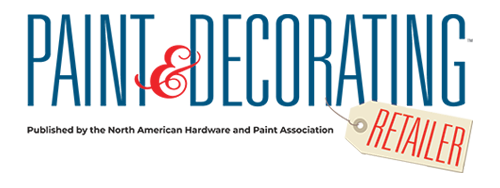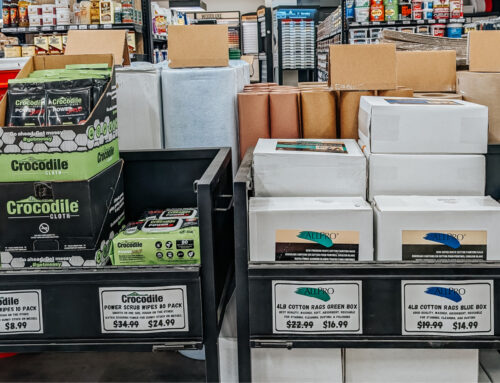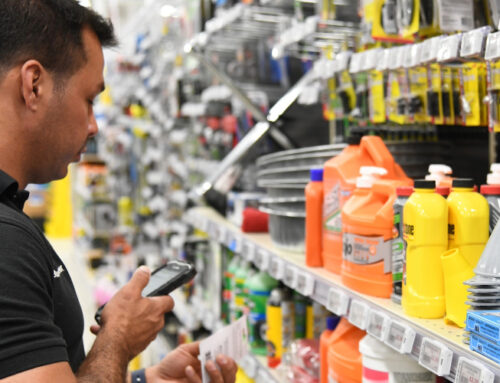From high performance industrial paint to marine coatings, curating your specialty paints and coatings department for commercial audiences could earn you some large accounts and boost your bottom line in
this category.
At The Paint Shop, which has 37 locations around Nova Scotia, New Brunswick and Newfoundland and Labrador, specialty marine coatings make up over 50% of its commercial sales. Almost all of its store locations are located in coastal cities, making them prime stores for ship owners, repairmen and even the Coast Guard.
“We sell everything from fluorescent paint for buoys to coatings for large cargo ships,” says Amanda Mosher, The Paint Shop senior outside sales representative.
Mosher shares how she relies on purposeful marketing, high caliber customer service and helpful training to find success in the specialty paints and coatings category.
Marketing Matters
When it comes to promoting the operation’s industrial marine coatings and other specialty paints, Mosher says it’s more of a sales pitch that involves cold-calling and visiting potential customers.
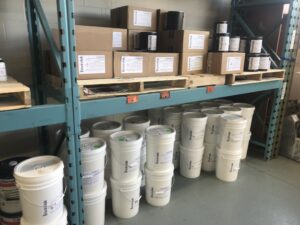 “Recently, I visited some of our customers along with two different paint suppliers that we stock,” Mosher says. “We went to their shipyards and talked about new product offerings.”
“Recently, I visited some of our customers along with two different paint suppliers that we stock,” Mosher says. “We went to their shipyards and talked about new product offerings.”
By physically meeting her customers where they are, Mosher says she’s able to put a face to her store’s brand. When she visits, she leaves a business card so when a problem arises, they will hopefully remember her specifically and reach out for help.
“A lot of our customers are people I’ve talked to in the past eight to 12 months,” Mosher says. ”Marketing industrial marine coatings is all about the long game, rather than multiple small wins.”
Above and Beyond
For commercial customers, the transaction goes beyond selling a product. The sales process doesn’t end when the liquid leaves the can; it continues until the product is applied and the customer is satisfied with the result.
Providing this level of follow-up service sets The Paint Shop apart, ensuring customers feel supported throughout the entire process, from purchase to application.
“It’s about the level of service you provide,” Mosher says. “The sales process isn’t over until the paint they purchased is on their boat. After customers apply their paint, I’ll follow up with them to make sure they’re happy with the product we sold them.”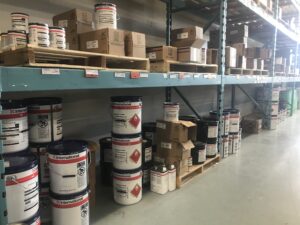
Although The Paint Shop has the capacity to fulfill large quantity orders, their stores are still able to fulfill the needs of everyday customers and large commercial customers who don’t need thousands of gallons at a time.
Keeping a small amount of paint for portions of ships that don’t require thousands of gallons is another way the store is able to serve large clients with small needs. Their business thrives on being set up to support the needs of both large and small accounts.
Knowledge plays a critical role in the operation’s relationship with its customers. Mosher’s customers know that if she doesn’t know an answer, she’ll do everything she can to find a solution. By building trust and maintaining expertise, customers will continue to return knowing they will receive solutions to their problems, even when they don’t have answers immediately.
Another part of providing an extra level of service is making the payment process easy. When it comes to pricing large commercial jobs, Mosher says understanding your customer’s timeline is crucial. If a project won’t begin for several months, Mosher needs to account for potential price increases and leave
margins in her quotes to account for those.
“Price is usually the last thing my clients care about,” she says. “They need the product, and they’ll pay for it regardless of the price. But I need to be sure I am protecting my margins.”
Mosher says the majority of The Paint Shop’s large clients place their orders over the phone and have their order delivered to the specific port where their ship will be dry docked for the job.
“Being able to cater to these larger clients by offering easy ordering and the ability to ship directly to them allows us to take on more clients because we don’t have to physically store the paint at each store and wait for customers to come buy it,” Mosher says.
Keep Up On Training
Mosher says training new employees about every aspect of their business is crucial to them succeeding in their roles, especially when it comes to specialty paint and coatings.
“A lot of our training involves product knowledge and knowing what certain coatings are made for,” Mosher says.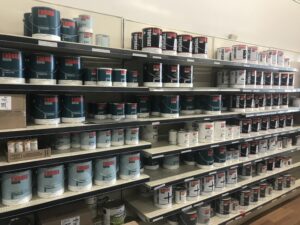
Training doesn’t always have to be retail related to be effective, however. Mosher recently completed the Association for Materials Protection and Performance (AMPP) Coatings Inspector Program Level One certification to better understand protective coatings and how to sell them.
The AMPP course is designed for people interested in a career in coatings inspection who want to learn about protective coatings for pipelines, storage tankers and other key marine infrastructure elements. Mosher says taking the course gave her the knowledge and confidence to share what she learned with her team and be able to teach other employees what she learned at the course, helping everybody better serve their customers.
“The course gave me a better understanding of the protective coating products we sell, why they’re needed, the best way to apply them and how to explain that information to potential customers so they have faith in what we do,” Mosher says. “The more knowledge we have about what we sell, the better we are at our jobs.”
